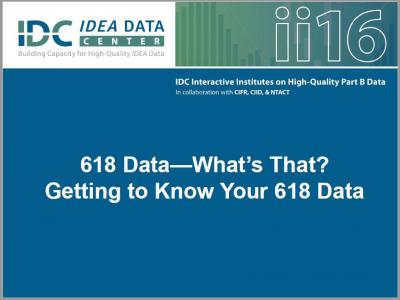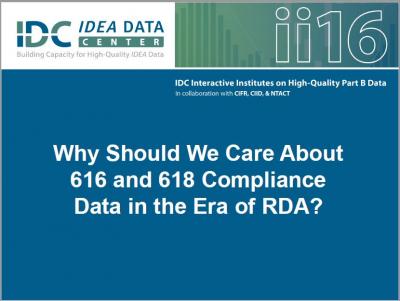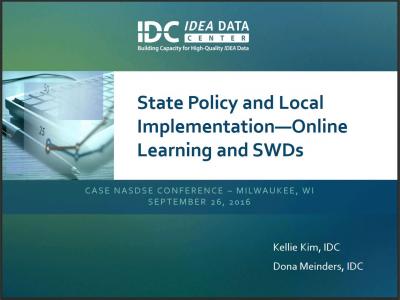Site Search
Results 8 - 14 of 19
Format: Presentations
Using Compliance Data for Program ImprovementIt can be challenging to bridge the huge shift from a focus on solely compliance-driven data to an emphasis on results-driven monitoring. Compliance data can be hard and fast; results-driven data can be harder to pin down. This topical burst provided an overview of compliance data, the interrelationship between compliance and results data, and existing processes that can help bridge the gap between accountability and program improvement.
Format: Presentations
Collecting High-Quality Data: Why It Is ImportantThis presentation focused on what is meant by the term “data quality” and provided information regarding the importance of high-quality data in the collection, reporting, and use of data in local and state decision making. Presenters shared actual examples from state experiences.
Format: Presentations
618 Data—What’s That? Getting to Know Your 618 DataHave you heard these terms 618, 616, EDFacts, EMAPS, file specifications, OMB-MAX, GRADS360, Data Quality Reports? Do you understand what they are referencing? Do you want to gain a higher knowledge of these terms? Participants in this presentation learned more about IDEA data reporting requirements in relation to the 618 data collections. They also learned about data quality considerations and tools states can use when going through the data collecting and reporting procedures.
Format: Presentations
Why Should We Care About 616 and 618 Compliance Data in the Era of RDA?Some have suggested that RDA and the shift from a focus on compliance to a focus on improving results for children with disabilities appears to have relegated compliance data to the back of the bus. Presenters from the U.S. Department of Education, OSEP highlighted the crucial role that section 616 and section 618 compliance data still play in RDA. Additionally, presenters shared ideas on how these data can be used not only for compliance but also to improve results for children and students with disabilities.
Format: Presentations
Collecting Quality Data: Why It Matters and Guidance to Improve Our ProcessThis presentation provided information that would allow participants to increase their knowledge of what constitutes high-quality data, how to improve processes for collecting high-quality data, and the use of high-quality data for measuring program effectiveness.
Format: Presentations
State Policy and Local Implementation—Online Learning and SWDsFindings from IDC’s white paper and interviews of select states revealed that LEAs are responsible for determining LRE and implementation and monitoring of IEPs in online environments. Presentation of findings were followed by a panel discussion of states and LEAs to discuss key problems of practice and needs for resources that IDC can develop to support greater understanding of implications of online learning for SWDs and the relationship to high-quality data.
Format: Presentations
Equity, Inclusion, and Opportunity: Creating Educational Systems That Meet the Needs of All Groups of StudentsMany schools and districts have been identified as low performing or disproportionate because of disparities between subgroups on a variety of success measures. Other schools and districts are proactively trying to address identified success gaps. Presenters from IDC demonstrated IDC's Success Gaps Toolkit that can help schools and districts 1) prepare all of their students for success in college and careers by addressing success gaps, 2) collect and use quantitative and qualitative data for the purpose of root-cause analysis of those success gaps, and 3) focus attention on those root causes for the benefit of children and students in the lowest performing subgroups.








